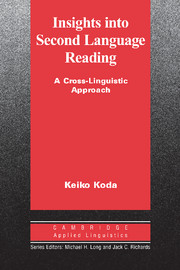Book contents
- Frontmatter
- Contents
- Tables and figures
- Series editors' preface
- Foreword
- Acknowledgments
- I THEORETICAL FOUNDATIONS
- II ESSENTIAL COMPONENTS
- 3 Word recognition
- 4 Vocabulary knowledge
- 5 Intraword awareness and word-knowledge development
- 6 Information integration in sentence processing
- 7 Discourse processing
- 8 Text structure and comprehension
- III LOOKING AT THE WHOLE
- IV THEORY INTO PRACTICE
- References
4 - Vocabulary knowledge
Published online by Cambridge University Press: 05 October 2012
- Frontmatter
- Contents
- Tables and figures
- Series editors' preface
- Foreword
- Acknowledgments
- I THEORETICAL FOUNDATIONS
- II ESSENTIAL COMPONENTS
- 3 Word recognition
- 4 Vocabulary knowledge
- 5 Intraword awareness and word-knowledge development
- 6 Information integration in sentence processing
- 7 Discourse processing
- 8 Text structure and comprehension
- III LOOKING AT THE WHOLE
- IV THEORY INTO PRACTICE
- References
Summary
Successful comprehension is heavily dependent on knowledge of individual word meanings. The widely recognized relationship between vocabulary and reading comprehension attests to the crucial role word knowledge plays in text understanding among both L1 and L2 readers (e.g., Alderson & Urquhart, 1985; Anderson & Freebody, 1983; Carrell, 1988; Carroll, 1971; Davis, 1968; Koda, 1988; Qian, 1999). What is less well understood is that there is also a reverse relationship – that is, vocabulary learning and processing are equally dependent on comprehension. Inasmuch as multiple meanings often are associated with a particular word, its precise meaning is determined in large part by the context in which it appears. Moreover, such meanings are closely linked with the reader's real-life experience. What is triggered by individual words, therefore, may go well beyond dictionary definitions. The word house, for example, can evoke all the different images of houses that readers have actually encountered, ranging from a large mansion to a decrepit shack with a leaking roof. Selecting the particular meaning best fitting the emerging text interpretation is vital to accurate content understanding.
Vocabulary processing during reading necessitates interrelated processing skills, including constructing a context, accessing stored information through visual word displays, selecting a relevant meaning based on contextual information, and evaluating the appropriateness of the chosen meaning in subsequent sentences. Despite their potential impact on both theory and practice, relatively restricted attention in L2 research has been given to the ways in which vocabulary and comprehension mutually enhance operations and development.
- Type
- Chapter
- Information
- Insights into Second Language ReadingA Cross-Linguistic Approach, pp. 48 - 70Publisher: Cambridge University PressPrint publication year: 2005



